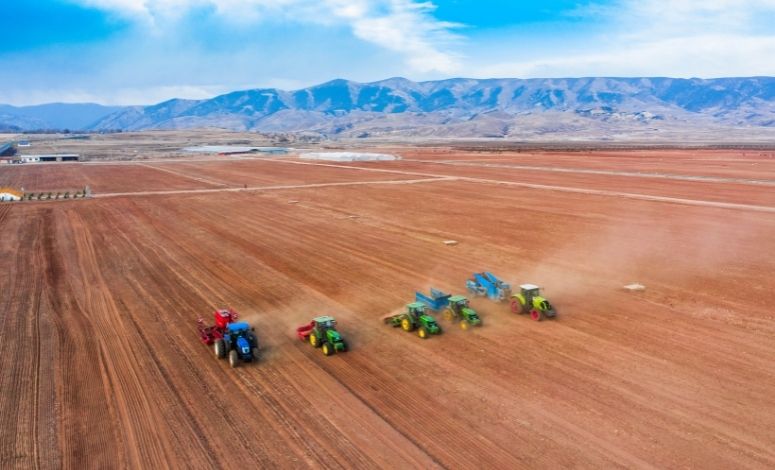
Alibaba Group last week rolled out 14 measures to boost rural economies in China, expanding its investment and philanthropic efforts in rural education, female empowerment, healthcare, digital infrastructure and e-commerce development for present and future generations. Dubbed the Alibaba Rural Vitalization Fund, this effort extends Alibaba’s Poverty Relief Fund, a philanthropic initiative the company set up in 2017.
According to the latest philanthropic report released by Alibaba’s Poverty Relief Fund, the company has been accelerating rural revitalization efforts during and in the aftermath of Covid-19 in some of China’s most impoverished areas through e-commerce and digitalization. In 2020, Alibaba’s various e-commerce platforms sold more than RMB303.7 billion ($47.2 billion) worth of agricultural products, spotlighting an increasing number of rural merchants and products from China’s most poverty-stricken counties and regions.
“Getting rid of poverty is not easy. The solution is to deliver poverty alleviation and rural revitalization by leveraging Alibaba’s existing capabilities and give full play to the unique value of digital technologies. We need to persist in being an active contributor to rural revival and a pathfinder that can apply the capabilities of the internet and digital technology to rural development and innovation,” said Alibaba Group Chairman and CEO Daniel Zhang at the revitalization fund’s conference held in Gansu.



Transforming Produce into Products
The first step to unlocking prosperity in rural communities in today’s e-commerce market is to identify and develop the right products. Since last year, Alibaba has opened up its design capabilities to work directly with farmers and agricultural hubs to help transform rural produce into marketable e-commerce products.
The process hasn’t been without its difficulties. Marketing and selling directly to mass consumers has been a longstanding challenge for rural farmers and suppliers in China due to a lack of market understanding, resources and sales channels. Geographically, they are far from the country’s fast-moving urban market, hence why many are reluctant to try e-commerce and digital adoption in the first place.
“The farmers I spoke to were skeptical about their apples being able to sell for premium prices. They were down to earth but knew little about the type of commercial and branded packaging urban consumers sought after,” said Alibaba designer Wu Yanmeng.
It took Wu several tries to convince 59-year-old apple farmer Zhang Jiacheng to get on board and take a chance on selling online. Drawing inspiration from local cultures, Wu created visual designs and rebranded Zhang’s apples and other agricultural produce and helped sell more than 60,000 kilograms of products during a special three-hour livestream dedicated to local farmers from Lixian county on Taobao Live, Alibaba’s livestreaming platform.
For urban consumers, watching farmers livestream from their farms, fields or rice paddies created added credibility and trust for the products being sold. This type of interaction also explains why rural livestreaming has been gaining popularity on Taobao Live over the past few years. From 2017 to 2020, more than 110,000 Taobao Live hosts broadcast more than 3.3 million livestream sessions to promote agricultural products. The company’s livestreaming efforts collectively helped drive more than RMB15 billion in agricultural produce sales and boosted household incomes for over 1 million villages, said Alibaba.
Connecting Communities through Logistics
To promote digital inclusion, Alibaba’s logistics and delivery arm, Cainiao, is rolling out more than 20 smart logistics centers across China to serve agricultural and production hubs in remote areas. These integrated centers serve multiple purposes, including transportation, delivery and value-added services such as additional product processing and repackaging.
A robust logistics infrastructure is essential to help rural and remote communities overcome geographic isolation and reach newfound prosperity in the digital age. For example, Xinping, an autonomous county in the southwestern Chinese province of Yunnan, is both an agricultural hub and home to many ethnic communities. The furthest fruit-growing community is located 130 kilometers away, or an 8-hour drive, from the county center. Transporting fruits from these communities to the nearest city is a challenge, let alone selling products to the rest of the county.
Since 2020, Cainiao has been piloting a tiered logistics network and co-distribution points across Xinping to broaden farmers’ connection to e-commerce, specifically by making express delivery available to rural shoppers and farm-to-hub pickup services possible for farmers interested in selling online. Between early February and April, the Cainiao-Xinping Logistics Center helped ship 1,800 tons of navel oranges. This initiative has made doing business online more affordable than ever for rural merchants and has helped lower the average shipping cost to RMB0.3 per package.
Talent Education in Rural China
Believing that talent education is the fundamental driving force for rural revitalization, Alibaba launched a full-time rotational program that dispatches company employees to work in some of China’s most poverty-stricken areas. Their mission is to introduce new tools and technologies to China’s countryside, cultivate talent development and sustain rural innovations.
In terms of digital and practical education for the next generation, the company will expand its philanthropic investment to fund 1,600 rural principals, teachers and graduates to provide vocational training relevant to today’s digital economy. The fund will also sponsor 1,000 professional courses and train 1 million rural e-commerce talents this year.
Lastly, the revitalization fund will help provide 100,000 employment opportunities for women in underdeveloped areas and will digitize and improve rural medical systems in 300 county hospitals for more than 7,000 grassroots medical practitioners in China.
Sign up for our newsletter to receive the latest Alibaba updates in your inbox every week.




